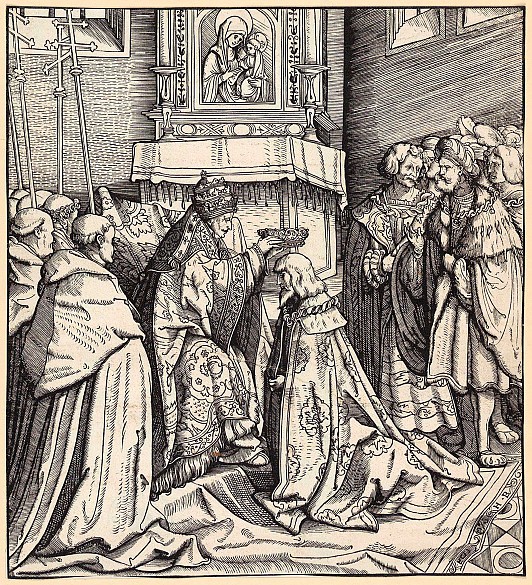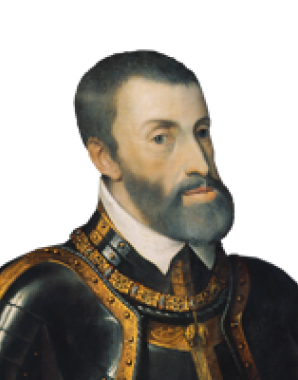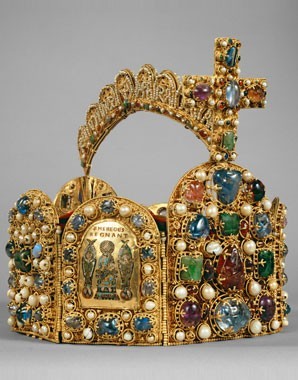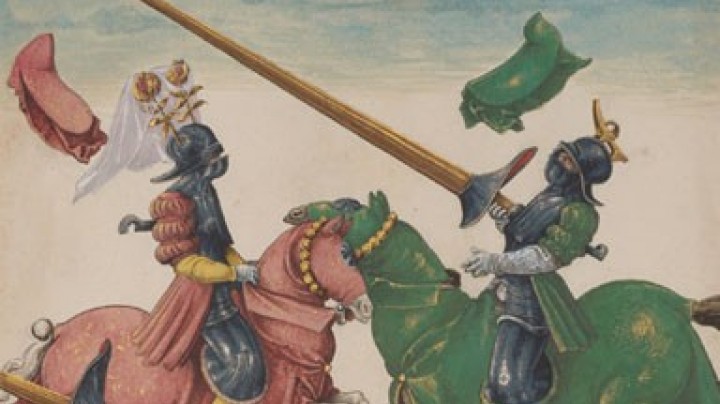Maximilian and the emperorship: a balancing act between utopia and reality
The imperial title was central to Maximilian’s sense of identity. He saw himself as the leader of the Christian world, and in this role pursued plans that were partly utopian in nature. The actual political situation and the constant problem of lack of money prevented him from realizing his dreams of political power within the Empire.
In 1493 his father, Emperor Frederick III, died. Maximilian had been elected Roman-German king back in 1486, while his father was still alive. In his efforts to obtain the imperial title Maximilian was confronted with the problem that coronation by the Pope, as demanded by the medieval tradition of the Empire, was not achievable, given the precarious situation that obtained for Maximilian in Italy. In 1494 the French king began to extend his sphere of influence in Italy, and Venice was in any case one of his sworn adversaries. Maximilian had little to offer in response: almost all of northern Italy was in the enemy camp, and a campaign against Rome was not feasible. With his excessive sense of monarchical mission, this was hard for Maximilian to accept, as at least nominal dominion over Italy was essential for his concept of the Empire as a continuation of the Roman Empire of antiquity.
Maximilian eventually resorted to a compromise. In 1508 he proclaimed himself the elected Roman Emperor in Trento, foregoing coronation by the Pope. The last Habsburg to be crowned by a pope was his successor and grandson Charles V, whose coronation, however, took place in Bologna rather than Rome. Thereafter the Habsburg emperors dispensed entirely with papal coronation. After their election as emperor in Frankfurt am Main the coronation was performed by the spiritual electors of the Empire.
Linked to the ideal of imperial office that was rooted in the medieval intellectual world was the role of the emperor as defender of Christianity. Maximilian interpreted this with reference to the rapid expansion of the Ottoman Empire in south-eastern Europe. From their heartland in Asia Minor the Turkish armies had conquered large swathes of the Balkans. The conquest of Constantinople in 1453 and the final destruction of the Eastern Roman Empire which although by then only a shadow of its former power still possessed enormous symbolic significance, had been a wake-up call for the Christian world. Maximilian was inspired by the idea of the Crusades and the utopian notion of resurrecting the ancient Roman Empire, leading to the union of western Latin and Greek-Byzantine Christendom, with him as emperor in the role of leader.
In 1511 he conceived another unrealistic scheme of uniting the title of emperor and pope in his person. This sprang from the general need for reform of the Roman Catholic Church, which led only a short time later to Luther’s Reformation (1517) and establishment of the Church of England by Henry VIII (1534).
Supported by an ambitious policy intended to extend his power base, Maximilian’s dynastic programme aimed at securing the de facto heritability of the imperial crown for the House of Habsburg. In this at least he was successful: beginning with his father Frederick, his descendants would bear the imperial crown continuously until the end of the Holy Roman Empire, with only one brief interruption from 1740 to 1745. However, another project pursued by Maximilian, namely to elevate the Austrian hereditary lands to the status of a kingdom, ended in failure.
Maximilian’s high-flying schemes were hampered by constant financial difficulties. Numerous wars, the costs of maintaining a magnificent court and the financing of his ambitious programme of political expansion devoured huge sums. Despite the enormous profits from the Tyrolean silver mines he was constantly on the verge of financial ruin. As a consequence of this he sometimes found himself in embarrassing situations, for example when he was forced to flee Innsbruck, leaving his second wife Bianca Maria Sforza and her retinue behind as security to his creditors. Maximilian left his successors a mountain of debt which generations of Habsburgs would struggle to pay off. The House of Habsburg became financially dependent on its financiers. One of the most prominent of these was the Fugger merchant dynasty from Ausgburg.















